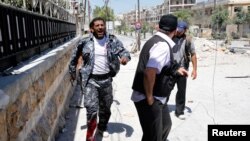In statements at home and abroad, the Obama administration has made its policies toward the Syrian government clear: Syrian President Bashar al-Assad must go.
"Our goal is to hasten the end of the bloodshed and the Assad regime," Secretary of State Hillary Clinton said during a recent trip to Turkey. "That is our strategic goal.”
But analysts say the U.S. is nowhere near achieving that goal.
The U.S. rhetoric has done little to help rebel forces who have been fighting Syrian government troops for nearly 18 months, and there is no sign that either side will put down their weapons.
U.S. options few
Analysts say at this stage, no one is really calling for a military intervention. But President Barack Obama has threatened the use of military force if the Syrian government were to use chemical weapons during its fight against the insurgents.
Some U.S. politicians are talking about another option - setting up a no-fly zone over Syria, similar to the one put in place in the Libyan conflict.
But experts also say such an endeavor would not be sanctioned by the United Nations Security Council, since Russia has made clear it would veto any resolution calling for a no-fly zone. Moscow and China have already vetoed several resolutions urging Mr. Assad to step down.
Some analysts say the lightly armed rebels must get more weapons in order to adequately fight the well-equipped Syrian army.
Several Western nations, including the United States and Britain, have been providing the Syrian opposition with non-lethal assistance, such as communications equipment, medical supplies and water purification kits.
Arming insurgents may backfire
Reports also indicate countries like Qatar and Saudi Arabia are either providing funds to various rebel groups to purchase weapons, or are directly supplying them with arms.
But Nadim Shehadi, a Middle East expert with London’s Chatham House, said providing weapons to the insurgents may be a bad move.
“It will backfire, because all these groups that are being armed now, whether for a good cause or not, will have to be disarmed later and that will be a very difficult process,” he said. “A direct military intervention has more legality. It’s easier to get rid of an occupying force than to dismantle militias later.”
Shehadi and others believe the United States must play a leading role now in finding a solution to the Syrian conflict. But others say nothing will happen until after the November presidential election - and even later, in January, when the winner of the election takes office.
View Latest Images
Assad will fight to the end
Fawaz Gerges, a Middle East expert with the London School of Economics, believes President Assad will fight to the bitter end.
“All the indicators seem to clearly show that he is hunkering down for the long haul," he said. “Not only he does not believe that he will meet the same fate as the Libyan president, Assad and his supporters and his regional allies, particularly Iran, believe that he has the momentum, he can still defeat the opposition. Barring an international military intervention, Assad will be able to survive for a long time.”
Former U.S. Ambassador to the United Nations John Bolton sees another possible way out for Mr. Assad.
“You can make an argument that it’s more humanitarian, it would save more lives and cause less economic chaos for Syria, to allow Assad and his family to escape, to take some of their money with them in order to end the conflict sooner," Bolton said. “But who can guarantee security for Assad? If he doesn’t feel that he can get such a guarantee, he may well conclude he might as well fight right to the end. That certainly appears to be what he and his regime are doing right now.”





